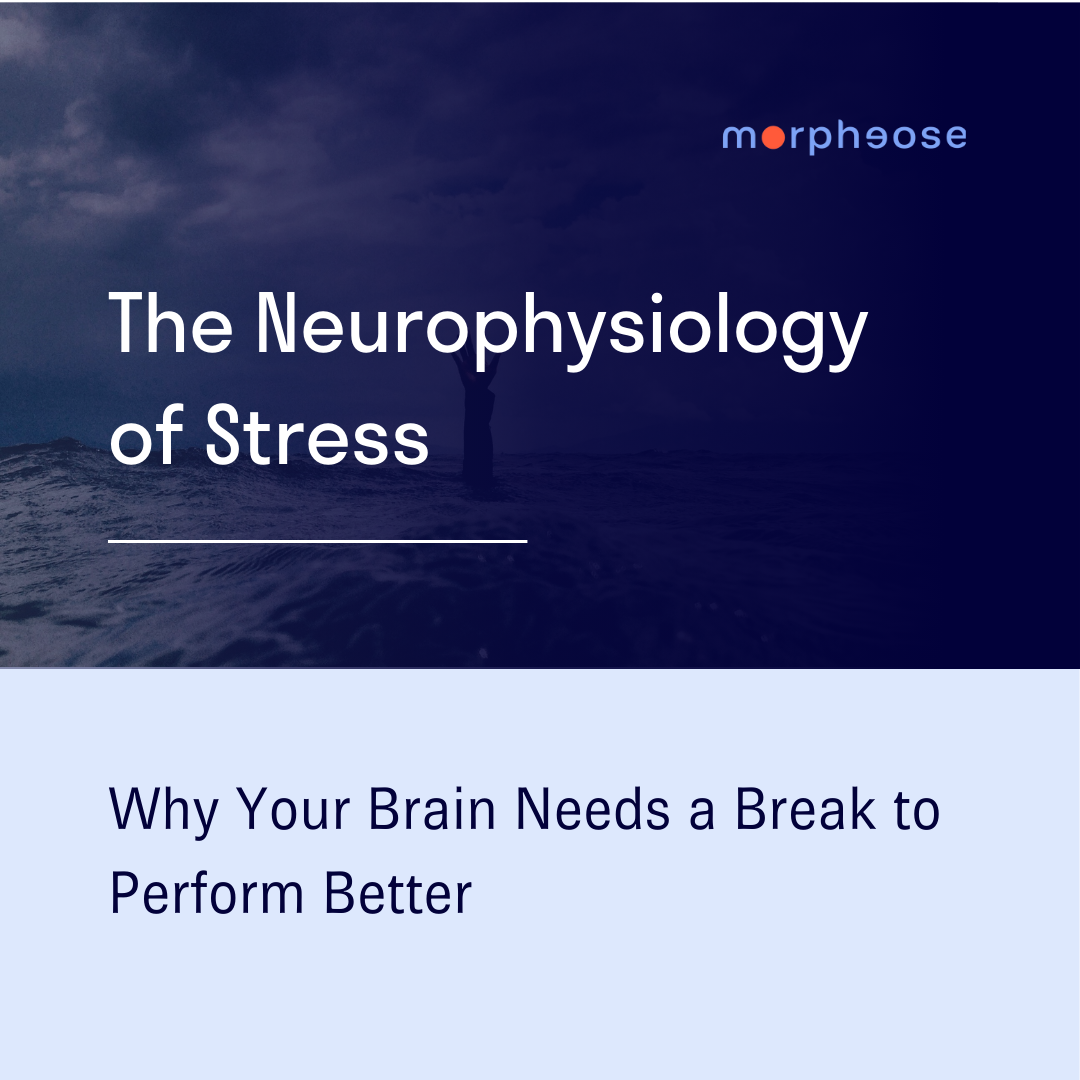
Your Brain on Stress: What You Need to Know
In today’s high-pressure world, stress is more than an occasional inconvenience—it’s a persistent challenge for many. While short bursts of stress can sharpen focus and boost performance, prolonged exposure has the opposite effect. Instead of fostering adaptability, chronic stress disrupts neural circuitry, impairing cognition, decision-making, and emotional regulation.
Over time, it also affects the neuroendocrine, autonomic, immune, and metabolic systems, gradually wearing down the nervous system [1].
Recognizing these effects can empower leaders and individuals to cultivate environments that support well-being and peak mental performance.
Did You Know?
- Chronic stress shrinks your brain. Long-term exposure to stress reduces neurogenesis in the hippocampus, the region responsible for learning and memory. This makes it harder to retain information and recall past experiences [1].
- Stress hijacks decision making. High cortisol levels weaken the prefrontal cortex, leading to impulsive decisions rather than strategic, well-thought-out choices [2].
- Your emotions become harder to regulate. Prolonged stress enlarges the amygdala—the brain’s fear center—making individuals more prone to anxiety, emotional reactivity, and irrational thinking [3].
- Stress affects performance at work. Studies show that employees under chronic stress struggle with cognitive flexibility, problem-solving, and effective communication, directly impacting productivity and morale [4][5].
With this in mind, it’s clear that prioritizing stress management isn’t just beneficial—it’s essential for sustaining mental agility and overall well-being.
The Brain’s Response to Stress: Why It Matters
The Stress Response Mechanism
When faced with stress, the brain activates the hypothalamic-pituitary-adrenal (HPA) axis, triggering the release of cortisol [6]. While this response helps in short-term survival situations, prolonged activation can have damaging effects on brain function and mental health.
The Impact on Cognitive Function
- Working Memory Impairment – Chronic stress disrupts neural plasticity in the prefrontal cortex, making it harder to process and retain information in real-time [2].
- Reduced Cognitive Flexibility – Stress locks individuals into rigid thought patterns, limiting creativity and problem-solving ability [7].
- Compromised Decision-Making – Elevated cortisol levels lead to reactionary, emotion-driven choices rather than balanced, rational decision-making [1].
This is why it is crucial to take breaks throughout your day where you allow your brain to disconnect from its activities. Taking these breaks will enable you to perform better and manage the stress better – you may not even perceive the stress as strongly after the breaks.
5 Science-Backed Tools to Regulate your Stress
Rather than accepting stress as inevitable, we can integrate simple, research-backed techniques to reset your nervous system and mitigate the stress response. The best part? You only need 10-15 minutes. We know time is a scarce resource, so we’re not here to recommend hour-long routines. These tools are designed for quick yet effective stress regulation.
- Introspection and Mindfulness
Mindfulness and introspection strengthen the prefrontal cortex and reduce hyperactivity in the amygdala, improving focus and emotional regulation [8]. Taking just a few minutes to observe your thoughts without judgment can help create space between stimulus and response, reducing reactivity and promoting clarity. - Leverage Deep Breathing Techniques
Breathing is the fastest way to shift your nervous system. Diaphragmatic breathing, such as box breathing or the 4-7-8 method, activates the parasympathetic response, signaling safety to the body and lowering cortisol levels [11]. Longer exhales promote relaxation, while longer inhales increase alertness—use them accordingly based on your needs. - Incorporate Movement-Based Practices
Slow, intentional movement, such as yoga or Tai Chi, synchronizes breath with motion, reducing cortisol and enhancing mental agility [12]. If you’re short on time, even a few minutes of slow, controlled upper-body movements can reset your nervous system and boost mental clarity. - Nature Immersion
Spending time in nature has been shown to lower cortisol levels and improve mood. Whether it’s a short walk in the park, gardening, or simply sitting outdoors, green spaces help restore cognitive function and reduce stress [13]. If stepping outside isn’t an option, position yourself near natural light, a plant, or an open window to absorb the benefits of nature. - Digital Detox
Excessive screen time—especially on social media and email—can amplify stress and mental fatigue [9][10]. Try setting brief tech-free intervals, using blue-light filters in the evening, creating no-screen zones to reduce cognitive overload and restore balance or scheduling intentional screen breaks throughout the day.
Our Method to Implement These Techniques in 10-15 Minutes
We understand that finding uninterrupted time can be challenging, so here’s how to make the most of these strategies. Do remember to put your phone and other smart devices on Do Not Disturb and set an alarm for 10-15 minutes. Find a space where you will not be interupted (even the stairwell or the bathroom will do):
Mindfulness & Introspection Practice:
- Monitor your status: Is your breathing pattern accelerated or shallow? You can also rate your stress level from 1 to 10.
- Map: identify recurring thoughts. What do they say? If they had a shape, color, or sensation, what would it be? Where do you feel the sensation? Aim
- Modulate: experiment with shifting the shape, color, or sensation—observe how your body responds when you change the parameters.
- Repeat: until your stress level decreases to a manageable number.
Deep Breathing for Nervous System Regulation
- Find a quiet space to sit or stand.
- To relax and reduce stress: Extend your exhales longer than your inhales (e.g. 4 seconds in through the nose – pause 7 seconds – 8 seconds out through the mouth).
- To energize: Focus on deeper, longer inhales with powerful inhalations (e.g. Wim Hof Method).
- Maintain this rhythm for a few minutes and observe how your body responds. Always listen to your body—stop if you feel uncomfortable.
Conscious Movement for Stress Release
- Stand in a space where you won’t be disturbed.
- Keep your feet planted and slowly move your upper body, allowing spontaneous motion to emerge. At the beginning you may need to give momentum to this movement yourself.
- Mirror the movement on both sides to restore symmetry.
- After 10-15 minutes, check in—how do you feel now compared to before?
Nature-Based Reset
- Step outside if possible, even for a moment.
- If outdoors isn’t an option, sit in direct sunlight or near a plant.
- Take a few deep breaths and observe the natural elements around you.
Digital Detox in Practice
- Set a timer on your phone, then switch it to Do Not Disturb.
- Move to a space free from screens—perhaps the kitchen, lobby, or a window.
- Take a moment to observe your surroundings and disengage from digital noise.
By integrating these small yet powerful techniques into your day, you can train your nervous system to recover more efficiently from stress. For example, you have just had a stressful morning or meeting – these techniques will help you calm down, make thought out decisions and be able to function more clearly the rest of the day. The more consistently you practice, the easier it becomes. What will you try first?
Small Changes, Big Impact
The effects of chronic stress on the brain are significant, but they are not irreversible. By incorporating small, mindful adjustments into daily routines, we can enhance cognitive performance, resilience, and overall quality of life.
Are these strategies ones you’d like to try? Start with just one and observe how it impacts your focus and well-being. Over time, these small changes can lead to profound results.
Take Your Stress Management to the Next Level with morpheose
While these techniques offer quick relief, long-lasting change requires a deeper, more intentional approach.
At morpheose, we provide in-depth guidance and personalized strategies to help you cultivate lasting presilience, regulate your nervous system, and unlock peak cognitive performance.
Whether through immersive coaching, structured programs, or expert-led workshops, we give you the tools to transform how you respond to stress. If you’re ready to go beyond quick fixes and build sustainable well-being, join us at morpheose and take control of your mental agility today.
Hypnosis Practitioner & TranseContact® Facilitator
Sources
- [1] McEwen, B. S. (2017). Neurobiological and systemic effects of chronic stress. Neuron, 95(2), 279-293.
- [2] Arnsten, A. F. (2009). Stress signaling pathways that impair prefrontal cortex structure and function. Nature Reviews Neuroscience, 10(6), 410-422.
- [3] Ressler KJ (2010). Amygdala activity, fear, and anxiety: modulation by stress. Biol Psychiatry, 67(12), 1117-9.
- [4] Bui, T., Zackula, R., Dugan, K., & Ablah, E. (2021). Workplace Stress and Productivity: A cross-sectional study. Kansas Journal of Medicine, 14. https://doi.org/10.17161/kjm.vol1413424
- [5] Golkar, A., Johansson, E., Kasahara, M., Osika, W., Perski, A., & Savic, I. (2014). The influence of work-related chronic stress on the regulation of emotion and on functional connectivity in the brain. PLoS ONE, 9(9). https://doi.org/10.1371/journal.pone.0104550
- [6] Mariotti, A. (2015). The effects of chronic stress on Health: New Insights Into the molecular mechanisms of brain–body communication. Future Science OA, 1(3). https://doi.org/10.4155/fso.15.21
- [7] Goldfarb, E. V., Froböse, M. I., Cools, R., & Phelps, E. A. (2017). Stress and cognitive flexibility: Cortisol increases are associated with enhanced updating but impaired switching. Journal of Cognitive Neuroscience, 29(1), 14–24. https://doi.org/10.1162/jocn_a_01029
- [8] Davidson, R. J., & McEwen, B. S. (2012). Social influences on neuroplasticity. Neuron, 76(6), 963-980.
- [9] Nakshine, V. S., Thute, P., Khatib, M. N., & Sarkar, B. (2022). Increased screen time as a cause of declining physical, psychological health, and sleep patterns: A literary review. Cureus. https://doi.org/10.7759/cureus.30051
- [10] Francisquini, M. C., Silva, T. M., Santos, G. C., Barbosa, R. de, Dias, P. H., Ruiz, A. B., Silva, J. M., & Stabelini Neto, A. (2025). Associations of screen time with symptoms of stress, anxiety, and depression in adolescents. Revista Paulista de Pediatria, 43. https://doi.org/10.1590/1984-0462/2025/43/2023250
- [11] Hopper, S. I., Murray, S. L., Ferrara, L. R., & Singleton, J. K. (2019). Effectiveness of diaphragmatic breathing for reducing physiological and psychological stress in adults: A quantitative systematic review. JBI Database of Systematic Reviews and Implementation Reports, 17(9), 1855–1876. https://doi.org/10.11124/jbisrir-2017-003848
- [12] Chawla, V. (2023, October 12). How yoga affects the brain and body to reduce stress: Stress management. Stanford Lifestyle Medicine. https://longevity.stanford.edu/lifestyle/2023/10/03/how-yoga-affects-the-brain-and-body-to-reduce-stress/
- [13]Hunter, M. R., Gillespie, B. W., & Chen, S. Y.-P. (2019). Urban nature experiences reduce stress in the context of daily life based on salivary biomarkers. Frontiers in Psychology, 10. https://doi.org/10.3389/fpsyg.2019.00722


